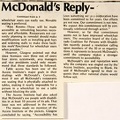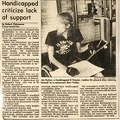Colorado Springs Sun
PHOTO (by Mary Kelley): Close up of protester Beverly Furnice's angry face as she reclined in her wheelchair, holding a poster in her fists, which reads "Accessible Bathrooms Now!"
Caption reads: Beverly Furnice holds a sign explaining one of the reasons she and other disabled people were picketing a local McDonald's Restaurant Friday.
[Headline] Officials Defends McDonalds' Record
By Ken Warren, Colorado Springs Sun
McDonald’s Restaurants is the industry leader in providing barrier-free access to the disabled, a top official of the corporation said Friday.
Robert L Keyser Ill. national director of media relations, rejected as “false" and “inappropriate" charges made by a group of wheelchair bound protesters that McDonald's discriminates against the handicapped.
“We think we're the leader in the industry in barrier-free accessibility”, but there are always things we can learn, " Keyser said, watching protesters picket the McDonald's Restaurant at 207 N. Wahsatch Ave.
As discussed, six weeks ago, he said, McDonald's plans to meet next week with
representatives of the Denver-based Access Institute to discuss their concerns.
“We want to listen. We also want them to learn a little more about McDonald's because we're committed to the community."
Asked about the potential impact of the second protest against McDonald's in as many days on upcoming talks, Keyser said, "It's certainly not a sign of the good faith" in which we’ve been trying to deal with them in Denver."
"He suggested "that the group had targeted McDonald's because of its size and visibility.
“We clearly think it's not appropriate, but "they've done it, and we're going to speak proudly about our record."
Keyser said ‘McDonald's had been striving since the 1960s to meet the needs of the disabled with ramps, drive-through lanes and other special accommodations.
Robert Conrad, a protester confined to a wheelchair because of cerebral palsy criticized McDonald's for failing to do more to make their 6,400 restaurants accessible to the disabled.
“We've tried to negotiate with McDonald's, but all they want to do is dialogue," he said.
- Created on
- Thursday 11 July 2013
- Posted on
- Monday 23 November 2015
- Tags
- accessible, Beverly Furnice, Bob Conrad, Colorado Springs, discrimination, McDonalds, wheelchair bound
- Albums
- Visits
- 1741
- Rating score
- no rate
- Rate this photo


0 comments